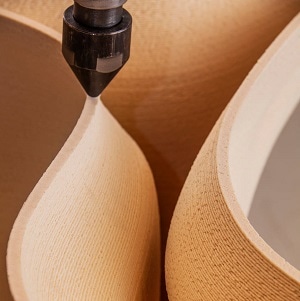In collaboration with ABB and Prenta, UPM has demonstrated large scale robot-based granulate 3D printing applications with UPM Formi 3D biocomposite opening new possibilities for designers and manufacturers. The robot based granulate printing enables time- and cost-efficient fabrication of large-scale 3D parts with short lead-time. Potential business areas include for example furniture design, molding or boat industry.

Next Level in Large Scale Industrial 3D Printing
"An industrial robot printing together with UPM Formi 3D biocomposite enables large components to be 3D printed with high geometrical tolerances. The PrentaRobo is designed for the manufacturing industry as a tool to create new and cost-efficient products," says Riku Rusanen, CEO, Prenta Finland.
ABB Robotics has played an important role in developing the innovative robot-based 3D printing system.
"This is a pioneering technological innovation that represents the next level in large scale industrial 3D printing. We've made possible to use an extrusion head in our IRB6700 6-axis robot to create a 3D printing system that's ideal for very precise and large scale additive manufacturing. External axes and trackmotion have been added to achieve an even bigger working area. Users can then control the extrusion head and create printing paths with our 3D simulation program RobotStudio, the industry's leading PC-based solution for offline programming, configuration and virtual commissioning," says Pasi Kukkonen, Product Manager, ABB Oy Robotics.
The Biocomposite Technology is Evolving
UPM Formi 3D grades been specially developed for 3D printing. It brings together advanced cellulose fiber and biopolymer technologies.
UPM Formi 3D is produced and sold in granule form directly for fused granular fabrication (FGF) or to producers of 3D filaments. Granulate based printing with ABB industrial robot together with UPM biocomposite is already in use for example in Sweden by 3D makerspace The Wood Region.
"Together with our partners, we are exploring the new possibilities in the field of large-scale 3D printing. Large scale 3D printing techology is fast evolving and we are part of the evolution with our biocomposite technology offering new wood-based materials for the markets," says Eve Saarikoski, Applications Manager, UPM Biocomposites.
No Warpage Problems with UPM Formi 3D
UPM Formi 3D's low shrinkage and self-supporting melt flow up to enabling printing up to 75 degree ensures that large objects with round or other complex shapes can be printed without warpage problems even directly to plywood surface. Wood like post processing of prints is another benefit of the biocomposite: Prints can easily finalized by conventional wood processing methods.
UPM Formi 3D grades are 100% recyclable and also available with FSC® and PEFC™ certification.